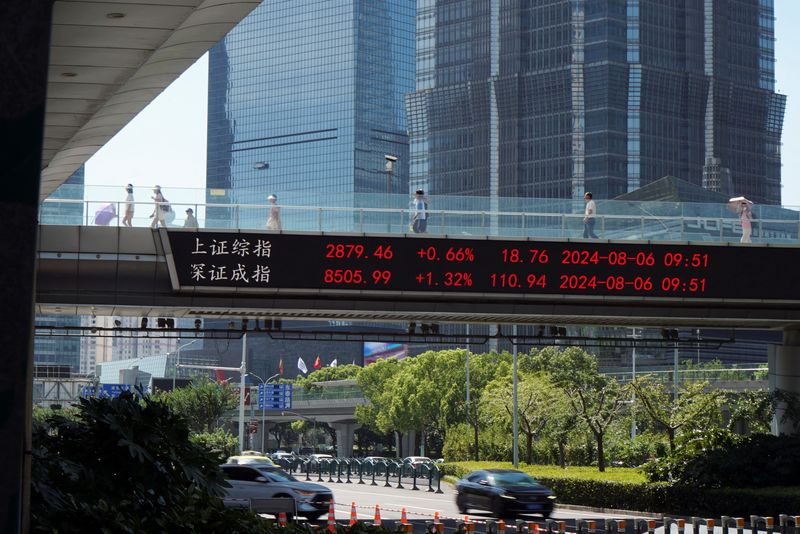SHANGHAI (Reuters) -China stocks struggled to rise on Tuesday despite the rebound in regional markets as investors remained concerned about its lagging economic recovery.
China's stock market slumped more than 1% in the previous session, but the decline was much less than regional peers as analysts say the Chinese market is relatively detached from the global rout due to its underperformance.
On Tuesday China's CSI 300 Index slipped 0.2% by the midday break, after opening up 0.7%, while Hong Kong's Hang Seng edged up 0.5%.
"There's limited impact as China's stocks are already lying on the floor, and relatively immune from volatility in global markets," said Xia Haojie, an analyst at Guosen Futures in Shenzhen, adding many foreign investors had already left China, and those who suffered heavy paper losses weren't likely to sell further.
China's lagging growth remains front of mind for investors after the world's second-largest economy expanded more slowly than expected in the second quarter amid deflationary pressures and a protracted property slump, with retail sales growth in June grinding to its weakest pace since early 2023.
Christopher Ying, investment manager at Shanghai Ju Cheng Asset Management Co, said the global market rout won't make China a safe haven, as the country's fundamentals remains shaky.
In China, the financial sector sub-index was lower by 0.98%, while the real estate index rose 1.05%. In Hong Kong, tech giants added 0.9%.
Regionally, Japanese stocks rallied at the open on Tuesday, nearly recovering Monday's losses, part of a broader recovery across battered Asian share markets. They gained following comments from overseas central bankers to soothe nerves.
"Markets appear calmer in early Asia trading ... We don't see an imminent (U.S.) recession, much less already being in one," said Alvin T. Tan, head of Asia FX strategy at RBC Capital Markets.

Overnight, Federal Reserve San Francisco President Mary Daly said it was "extremely important" to prevent the labour market tipping into a downturn, adding that her mind was open to cutting interest rates as necessary and policy needed to be proactive.
The comments underpinned market expectations that the Fed would cut by 50 basis points at its September meeting, with futures implying an 87% chance of such an outsized move.